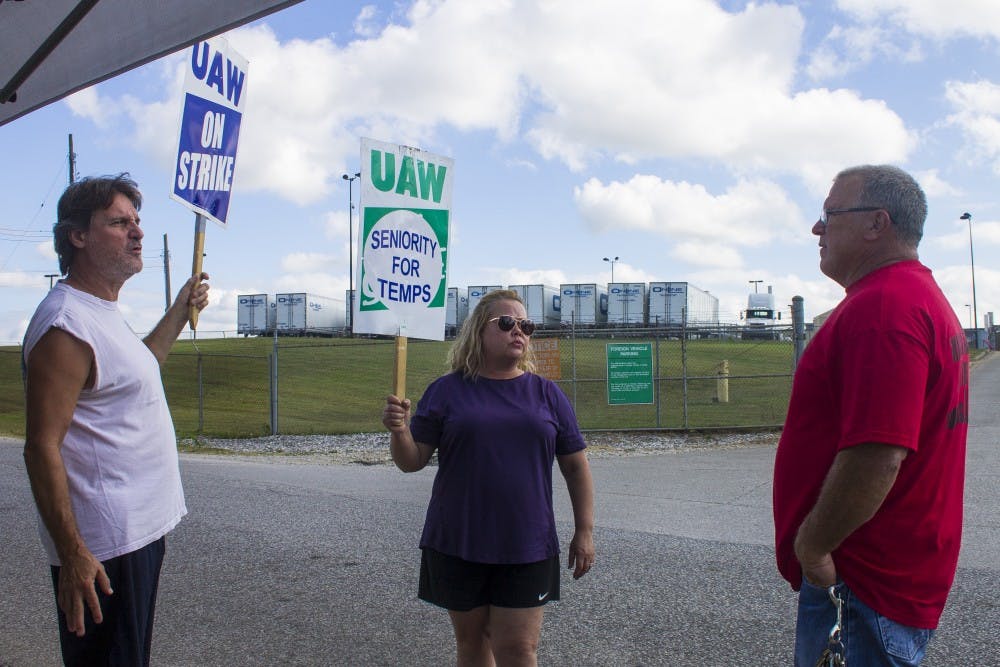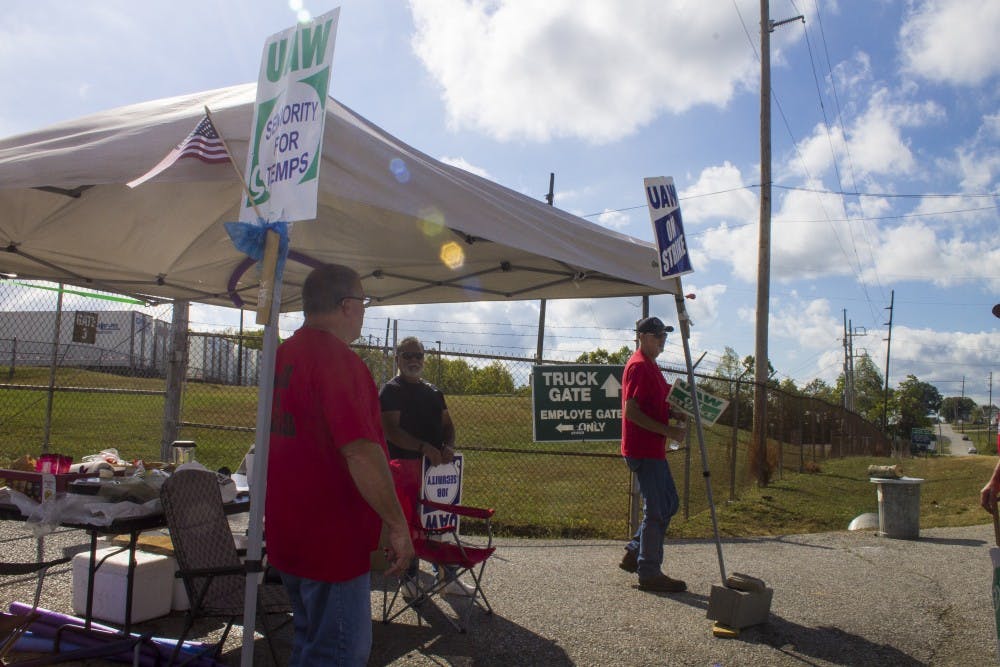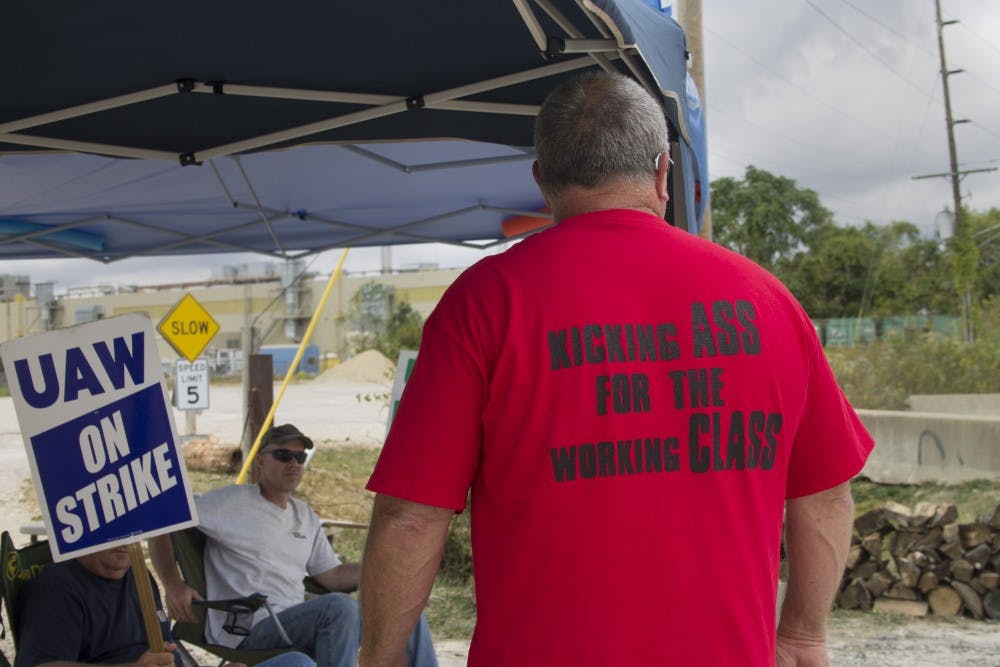BEDFORD — At each tent, a campfire fire burned, and the wind whipped the white soot and embers in all directions. Union workers, who had traded their T-shirts and sunglasses for sweatshirts and beanies, sat in camp chairs or stood around the fire, waving their signs when the occasional car passed.
It was late October and it had been more than a month since the United Automobile Workers’ strike had begun at the General Motors plant and autumn had arrived. Drivers still honked and waved, and the Bedford Police still turned on their sirens in support.
The strikers wanted to go back to work, but they didn’t want the long weeks of no pay to be for nothing. They wanted their share of GM’s new wealth they believed they’d earned.
Around the fires, they talked about GM’s CEO Mary Barra’s nearly $22 million paycheck and watched the few people who are still working in the plant go in and out of the buildings behind the tall fence, pointing them out by name and position.
“He needs to pull his britches up,” one woman said as she saw a man she recognized walk out.
Some union workers would wave at the handful of people they knew who were still working on the other side of the factory fence. Workers sometimes returned the wave and sometimes didn’t, fearing that if they showed support of the strike, they might lose their jobs.
The strikers also knew they were being watched. Cameras were pointed at the picket line, and managers would peek out the windows to watch them.
Tension, frustration and hope intermingled on the picket line as national negotiations with GM dragged on. Kevin Hutchinson, president of Bedford’s UAW Local 440, was determined to stick it out for long haul if that’s what it took to get what they wanted.
“We’re in it now,” he said.
The strike would last six weeks, the longest nationwide auto strike in 50 years.
At 12:01 a.m. on Sept. 15, Hutchinson, or “Hutch” as everyone calls him, walked into the Bedford GM plant carrying the blue and gold flag of the worker’s union.
Word spread quickly on the factory floor, where workers were casting aluminum to make engine and transmission parts and assembling Corvette chassis.
They shut down their die cast machines and semi-permanent molds, cleaned up their work stations and walked out of the factory doors, simultaneously starting a strike with nearly 50,000 GM workers across the country.
As they marched out together, union and American flag leading the pack, Hutch got goosebumps.

For more than 70 years, the Bedford GM plant had provided the best paying jobs in the area. Jobs with enough pay to start a family, own a house and retire comfortably. But now, good jobs were no longer a guarantee. Before GM filed for bankruptcy in 2009, the UAW gave up worker benefits to keep GM afloat. Since then, GM had bounced back financially but had been slow to give back the benefits and level of pay union workers enjoyed before the bankruptcy.
The union also agreed to let GM hire more temporary workers after they filed for bankruptcy, positions that have ended up being not so temporary.
Temp workers, many of whom have worked for GM for several years, perform the same jobs as permanent employees, are paid a little more than half of what a permanent employee makes, have significantly less health insurance, receive three unpaid vacation days a year and must give 24-hour notice before taking those days. They are not guaranteed a certain number of hours a week, and the union can do little to protect them. Their hourly pay starts at $15 an hour and is capped at $19 an hour.
One temp worker got his wisdom teeth pulled and wasn’t given permission to stay home after the surgery. Instead, he was given a bag to spit blood in as he worked.
Hutch has a keen eye for corporate greed and cutting corners, and not just in the auto industry. He rants about how little employees get paid at Walmart, what teachers are paid at schools and what the catering workers at Los Angeles International Airport who went on strike this past June made.
Hutch thought about what Japanese admiral Isoroku Yamamoto allegedly wrote after the attacks on Pearl Harbor: “I fear all we have done is to awaken a sleeping giant and fill him with a terrible resolve.” He wonders if Mary Barra feels the same way.
As GM tries to tighten its spending to compete with foreign car companies, job security is the deepest concern among many workers. GM closed three plants in the past year to cut expenditures and invest in self-driving cars and electric vehicles, which the company sees as the future of the industry. These vehicles, by nature, will require fewer human hands to put them together and will result in the loss of many jobs.
In the meantime, employees of shuttered plants get transferred to plants around the country, becoming “GM Gypsies” and leaving homes and families behind.
President Donald Trump promised to keep manufacturing jobs in America in his 2016 campaign and even visited the workers of the now-shuttered Lordstown, Ohio plant, and told them not to move or sell their houses, that he would fight for their jobs.
Hutch, who doesn’t even like to call Trump “president,” said while union workers generally vote blue, he knows workers who voted for Trump because of his promises and now regret it.
“I think there’s huge things that could have been done to help the auto industry,” Hutch said.
But those things didn’t happen.
In the blustery autumn wind, union workers threw more wood on the fire, making sparks fly. Older workers on the picket line reflected on the struggle each generation of autoworkers has made to secure good paying, permanent jobs for the generation after them. It was their turn to do that now, but was it even possible?
From day one of the strike, Hutch was at Union Hall and on the line seven days a week, sometimes for eight to twelve hours each day. He credited his strike captains for keeping everything running smoothly, but he also did his own rounds.
He stopped at each of the eight tents that surround the factory, listening to concerns, answering questions, giving updates and making sure everyone has enough firewood for the night and food and water for the day. He gave hugs and handshakes and knew many of the people by name.
Hutch has been working for GM for 43 years and has been UAW president for two. He’s 65 and has four grown sons and five grandchildren.
His hands are rough, and his fingers are stubby. He wears clear hearing aids that barely show, but that everyone teases him about it. He lost his hearing from the factory noise and now reminds the younger workers to wear their ear plugs so they won’t end up like him.
His usual outfit is blue jeans and a UAW red T-shirt. One says “Kicking Ass for the Working Class” on the back.
“This should have happened earlier, and it got out of hand,” one man said as Hutch stopped to talk.
“Well, now it’s time,” Hutch said. “Now it’s going to happen, you know?”

In small towns like Bedford, the solidarity of the community has been key to the strike’s success. In a back room at Union Hall, a food pantry was started for families struggling to get by on the $250 UAW workers receive each week while on strike.
The hall became a hub for workers not on picket duty. Kids weaved in and out of the chairs in the main meeting hall and women carried in donations of diapers, feminine products and food.
A whole corner of the main room was occupied by cases of water bottles and Gatorade. “UAW On Strike” signs laid on tables and a Rosie the Riveter poster kept watch over the snacks.
Outside Hutch’s office at Union Hall, a whiteboard was crammed with names of people and community groups and donated items, ranging from Clarisa Guy’s apples and cookies to Georgia Wood’s muffins, danishes and 30 pounds of ground beef.
While many of the strikers were permanent employees, they were on strike in large part for their temp worker “brothers and sisters,” many of whom are the younger generation of the community — sons and daughters, neighbors and friends — who are trying to start families and build their savings. Because their pay has been so low, the strike hit temp workers hardest.
Zach Jones, 27, is a temp worker at the Bedford plant. He started working there a year and a half ago and doesn’t plan to leave — it’s the best job around here, he said. But right now, there’s no way for him to climb the ranks with temp pay capped at $19 an hour.
He’s been dipping into savings like everyone and said he could probably make it another month without pay. Jones was getting paid between $15 and $16 an hour before the strike.
“I at least want a pathway to becoming full time,” Jones said. “Instead of going out there blind and wondering if it’ll ever happen.”
Jones stood in the chilly air, his hands deep in his sweatshirt pockets, not talking as much as the other workers at his tent. He was quiet but frustrated.
Under a different tent, Marquita Deckard sat in a camp chair embroidered with her name that she uses at her horse races. She’s a barrel racer and during the barrel season, she lives in her horse trailer on competition weekends.
Deckard was once a temp worker who went on strike to get hired as permanent worker. In 2007, the UAW worked to get temp workers hired as permanent workers and got what they wanted — and quickly. The strike lasted two days.
Deckard was one of the last temp workers who got hired as a “Tier 1” permanent worker. Tier 1 workers got a starting wage of $28 an hour and make up to $33 an hour now, while anyone hired after 2007 is a Tier 2 worker, has a starting wage around $17 an hour and can make only up to $28 an hour after eight years of working.
“I just got lucky,” Deckard said.
For picketers, there was more to being outside 24/7 than just keeping cool or warm. After dark, they had gotten quite a few furry visitors. One tent backed up to a tall fence with grasslands on the other side and one night, picketers saw a coyote, two deer and two skunks.
“We said, ‘Well, let’s just cut a hole in this fence and have a drive-thru zoo, charge a little admission fee and get by on the strike a little longer,’” one man joked.
Steve Haefke transferred to the Bedford plant five months ago from the closed plant in Lordstown, Ohio.
Lordstown and three other GM factories in the United States were "unallocated," or unofficially closed down, this the past year, a move by GM that angered the UAW because it went around the 2015 contract that said no plants were to be closed during the four-year contract.
Haefke, who has worked for GM for 25 years, wore a black Carhartt jacket with the UAW symbol embroidered in silver thread over his heart. He moved to Bedford with his wife, but his whole family is back in Lordstown. But he considers himself lucky.
“It’s not easy, but we’re only six hours away,” Haefke said. “Some of our guys are 21 hours away. You know, guys we worked with, girls we worked with, they ended up in Arlington, Texas, and scattered all over the country.”
GM Gypsies have become the norm in Bedford and factories across the country. At almost each tent on the Bedford picket line, at any given time, there is a worker who has been displaced by factory closings. Some are on their fifth or sixth plant. They are a product of an industry that is is being forced to evolve.
After plants close, workers have no choice but to move or quit. Haefke said this phenomenon has caused divorces and broken families.
When she wasn’t on the picket line, Deckard took care of her seven horses and slept in with Grizzly Bear, her German shepard. Her barrel racing season is over now. Every year, she rests her horses for the winter and works overtime at the plant.
Two weeks ago, she got a new 6-month-old-colt named Crimson.
“He’s just a baby,” she said. “So I’m starting to work with him.”
After long days of keeping up morale on the picket lines, the bench-press at Hutch’s favorite gym, the Iron Pit, was his place of peace.
“I get in there, and if I’m mad about anything, I’m mad at the weights,” Hutch said.
He has placed and often won competitions in world and national powerlifting championships.
At the Iron Pit, metal clangs and clinks. Hutch works his lats on a machine by pulling down a heavy handlebar attached by pulleys to 180 pounds of weights. He pulls the bar down and exhales quickly on each yank. Eight pulls, then rest. Eight pulls, then rest.
“There is a lot of truth in, ‘If your mind believes it, your body will achieve it,” he said.
At the beginning of the fifth week, Hutch was called to Detroit for a meeting. No deal had been reached, but a few days later, as Hutch stopped on the way to Detroit to shake hands with workers on the picket lines at the Fort Wayne pickup truck plant, he got the news. A tentative agreement had been made.
In Detroit, Hutch’s meeting about the contract that was meant to be about two hours dragged on for six.
Back in Bedford, workers were unimpressed by the contract that has just been released.
Although it gave temps a clearer path to becoming permanent workers, preserved their good health insurance and raised the pay of some workers, it would take time for some of the policies to be implemented. It also included the permanent closing of three of the four unallocated plants, including Lordstown.
Private booths were set up at Union Hall and the fairgrounds where all union workers marked their vote on a slip of paper over the course of two days. They voted the contract down 60-to-40, but nationally, it was approved on Friday, officially ending a strike that lasted six weeks.
To many of the older workers, it felt like the strike was just a fight to keep what they already had.
“We didn’t lose, but we didn’t gain anything, and I lost a lot of money,” Deckard said.
For Hutch, the strike was worth it, but the closings of the plants deepened his frustration with GM and his commitment to standing up for workers.
“They don’t care about families, they don’t care about people,” he said. “We’re just tools, so that’s why we have to fight.”
After the vote was announced Friday, workers would be allowed to go back to work voluntarily and starting Sunday night, everyone would be back to work officially.
Deckard went back for the first time at 6:30 a.m. Saturday morning. It would take a few days for the semi-permanent-molds she worked with to be warmed up and running smoothly again.
“It’s going to be a long week,” she said.
The smokestacks in Bedford will again be filled with white smoke this week, and cold machines will be coaxed out of their slumber. For now, life will go on until the next contract comes up or the next plant closes.
“They could still close plants over the life of this agreement,” Hutch said. “There’s no guarantees.”



![Dean_Reingold_ltr[52] (1).jpg](https://snworksceo.imgix.net/ids/25483b05-dabd-4378-92bd-70a32c2579f0.sized-1000x1000.jpg?w=1500&ar=16%3A9&fit=crop&crop=faces&facepad=3&auto=format)
